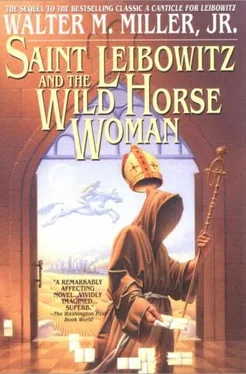“Elwen! Brother Elwen! Come back here, you filthy bugger!”
Blacktooth heard ascuffle behind him as he sprinted up the stairway. He paused on the landing to compose himself, then strode quietly through the reading room into the courtyard. Outside he paused in the blinding sunlight, dazed and confused. The myopic old man had mistaken him for Brother Elwen, a novice who worked for the groundskeeper. Blacktooth had seen Torrildo and Elwen together on several occasions, but thought nothing of it. Now he seemed caught in a trap the librarian had set for another. The mistake would not endure. Across the courtyard, in plain sight, Elwen was on his hands and knees, working manure into the soil under the rosebushes. There was no honorable escape. He started to report back to the copy room, but things might become embarrassing there, when the prior sent for him. He started again toward his cell, but the sound of running footsteps made him look around. It was Torrildo, sprinting toward the main gate. Blacktooth stood waiting for a commotion to follow, but nothing happened.
He waited a full minute. After a brief prayer to Saint Leibowitz, he made up his mind to return to the basement. At the bottom of the stairs, he met only silence in the dim light. He found the candle he had used earlier and looked behind the machine. The old librarian lay on his back. He clutched his head and rolled it side to side. There was blood on his forehead. Blacktooth bent over him.
“Who’s there?” he rasped.
“Blacktooth St. George.”
“God be praised, Brother. I need a little help.”
Blacktooth picked the old man up, edged his way around the machine, and staggered with him toward the stairs.
“Put me down. I’m too heavy for you. I’ll be all right in a moment.”
They rested briefly against the wall. Then Blacktooth draped the librarian’s arm around his neck and helped him up the stairs. Obohl was croaking and wheezing.
“It was Elwen and Torrildo. Those buggers. I knew. What they were up to back there. Just couldn’t catch them. Until today. You know, so much semen. Gets spilled. Behind that machine. They call it the seminary. Now. Now. Where did they go?” Still wheezing, he blinked around at his blurred world.
Blacktooth set him carefully on the end of a table in the reading room and made him lie down on it. Monks at the reading desks got up and quickly gathered around. One brought a drinking jug and wiped the librarian’s face. Another examined the cut on his scalp. Another asked, “What happened to you, Brother?”
“I caught them. I finally caught them. Brother Torrildo and Brother Elwen again, going at it behind the electric idol. Torrildo hit me—with something.”
“Torrildo hit you all right,” said Blacktooth. “But Elwen wasn’t there. It was me, Blacktooth St. George.”
He turned and walked away, not hurrying, and continued to his cell. He lay on his back and stared up at the picture of the Immaculate Heart of the Virgin until they came to get him.
Were it not for the fact that shoveling compost was defined as public punishment, Blacktooth might have preferred it as a career to the job of translating a monk’s-eye view of history for Nomads too proud to read. Taking the raw shit out of the privies and transporting it by wheelbarrow to the first composting bin was the smelliest part of the task. There he mixed it with thrice its volume of garden weeds, corn husks, chopped cactus, and plate scrapings from the kitchen, Each day he shoveled the stinking mixture from one bin to the next in line, allowing air to penetrate and hasten the decay. When the mixture reached the final bin, it was crumbling and had lost most of its odor. From there, he loaded it into a clean wheelbarrow and moved it out to the great pile near the garden, where it awaited the pleasure of the cultivators.
On the third day, after an interview with the prior, Brother Elwen went over the wall. Blacktooth expected relief. None came. For three weeks in full he prayed the compost-shoveling prayer, offering up each stinking shovelful on behalf of the soul of poor, poor Torrildo. That he fry in hell—is not my wish, O Lord, he managed to pray.
No one snubbed or shunned him (after he bathed), but the shame of public penance made him isolate himself. In his loneliness, in his cell by night, he sought ever more fervently the indescribable emptying of himself that seemed to occur in a kind of union with the heart of the Virgin: a heart not filled with sorrow, but made empty by sorrow, made open by sorrow, made selfless by sorrow, a heart which was a pit of loving darkness, wherein, sometimes, he glimpsed fleetingly another wounded but still beating heart.
“The Devil too has his contemplatives, they say” was his confessor’s harsh judgment upon the vision and upon Blacktooth’s private devotional practice. “The focus of contemplation must be Our Lord. Devotion to Our Lady is splendid, but too many monks turn to her only when their vows fit too tight, when obedience is hard. They call her ‘Refuge of Sinners,’ and so she is!—but there are two ways of looking at this: the Lord’s way, and the sinner’s way. Pay attention in choir, my son, and stop chasing visions at night.”
Thus Blacktooth learned not to mention the vision. He saw his confessor was made angry by it, for how could a professed monk who regretted his vows be granted any grace except that of contrition and repentance? He observed a similar attitude in Prior Olshuen, who, at the end of his three-week penance, sent him back to his regular work, but also ordered him to spend an hour a week with Brother Reconciliator for special counseling, to Blacktooth’s utmost chagrin.
Brother Reconciliator, a monk named Levion, was part-time assistant to Brother Surgeon as well as a Keeper of Memorabilia from certain ancient healing arts. He handled cases of senility, fits, depression, delusion, and—contumacy. He had also been ordained an exorcist. Olshuen, without doubting Blacktooth’s account of the incident in the basement, saw it as a manifestation of rebellious discontent, and saw the discontent as sin or madness.
Blacktooth’s devotion to the Virgin, however, continued and grew in the face of this disapproval. His old hero, Saint Leibowitz, was at least temporarily pushed aside to make more room for the Virgin. He had chosen Duren’s Perennial Ideas of Regional Sects for his next project, in preference to more Boedullus, partly because so many of Duren’s country religions were special cults of Mary, or of some local goddess who had borrowed Mary’s identity and carried Mary’s Babe on her arm. Duren even mentioned the Nomadic Day Maiden. It was a choice he would quickly regret, because of the extreme difficulty of translating theological ideas into Nomadic, but at first he was captivated by one section (“Apud Oregonenses”) which dealt with remnants of what had been called the Northwest Heresy a few centuries before. The description of the cult’s beliefs seemed to cast light on his own mystical vision.
“The Oregonians,” wrote Duren, “considered the Mother of God to be the original uterine Silence into which the Word was spoken at the creation. She was the dark Void made pregnant with light and matter when God roared ‘Fiat!’ Word and Silence were coeval, they said, and each contained the other.”
This reminded Blacktooth of the image of the darkening heart that became a pit of blackness containing another living heart. He was deeply moved.
“Thus is was impossible,” Duren wrote in a later paragraph, “for the cultist to evade the Inquisitor’s accusation that they made of the Virgin a fourth divine person, an incarnation of God’s female wisdom.”
Since no one at the abbey could read Nomadic except Wren and Singing Cow, Blacktooth felt safe in taking a few liberties with a work so resistant to understandable expression in that primitive tongue. In translating the word eculeum (“colt”), he could choose any of eleven Nomadic words that meant a young horse, and none of them were synonymous. But any one-word translation of the Latin “eternity” or “transubstantial” would only bewilder the reader. Theological terms, therefore, he left as Latin words in the Nomadic text, and tried to define them by lengthy footnotes of his own composition. But whenever he imagined himself trying to explain such matters to his late father or boss uncle, these footnotes became flavored with a facetiousness which he knew he would have to remove from the final version. Levity made the task less hateful, but strengthened his conviction that it was useless.
Читать дальше








